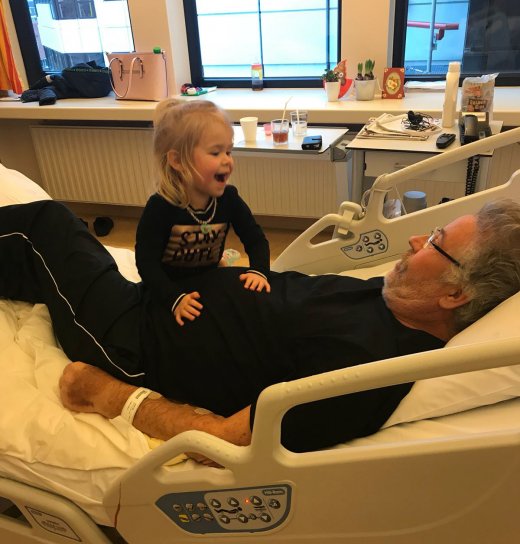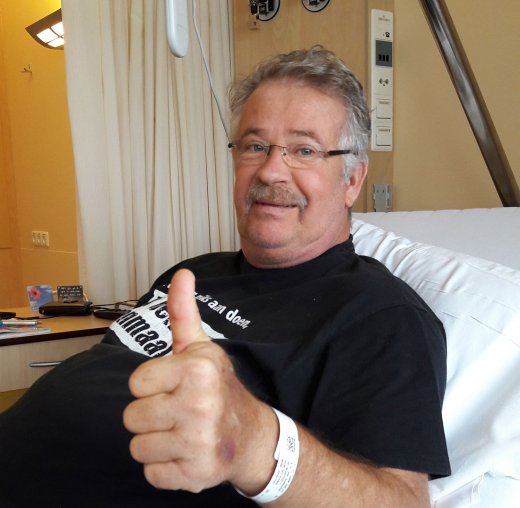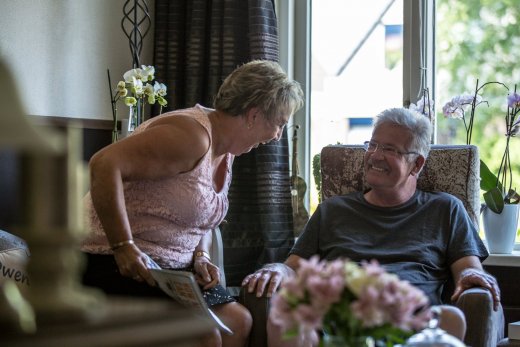04/07/2018
Personal stories: Gerard van Bokhorst
Antibiotic drugs are widely used in society because they are essential to combat infections. However, it is very difficult to give a patient the correct dose. When the dose is too low, the infection will not be resolved; when the dose is too high, the patient can suffer very severe and irreversible side effects. For SensUs Personal Stories, we spoke with Gerard and Anja van Bokhorst about their experiences with Gerard’s treatment with vancomycin, and about the importance of developing biosensors for this last-resort antibiotic drug.
My name is Gerard, I am 59 years old and happily married to my wife Anja. Together we have a family with four children. Unfortunately, I cannot say that I am born healthy, but at least I was born with an angel watching over me.
I was born with polycystic kidney disease. This is a heritable disease that replaces the kidney tissue with cysts. I started dialysis in 2006, but soon I realised that this is a very uncomfortable and time-consuming occupation. I had to go to the hospital three times a week to dialyse four hours, therefore I decided to start dialysing myself at home. I had to do some training to handle the machine but after that, I was able to dialyse independently at home, with the help of my wife. Now, I do this six times a week for 2.5 hours. I am not dependent anymore and it takes less time, as it is not necessary to travel for treatment. This ensures that I have time to enjoy my hobbies: spending time with my wife, playing with my grandchildren and motorcrossing. After dialysis I feel so much better!
Currently I do not have any kidneys. I once had a kidney transplantation, but unfortunately my body rejected the kidney. I am still on the waiting list for another transplantation, but before that my body has to be in a good condition, which is not obvious for me. The annoying part of being ill is not feeling ill, but accepting it. I have faced a lot of infections and other inconveniences, some of them were really critical, but I always managed to recover. Except when I got a Clostridium infection: I was damaged by that what was supposed to save me.
In November 2017 I got a bacterial Clostridium infection. I had to be treated with the antibiotic drug called vancomycin, which was dosed three times a day over three weeks. The dose was determined by a standard protocol, based on information such as body weight, length and age. However, I always joke that I am a special case since I do not have any kidneys and perform dialysis. This means that drugs have a stronger effect on me than on normal patients, because the drug is removed less efficiently from my body.
“The annoying part of being ill is not feeling ill, but accepting it.”
Nevertheless, everything went well and we thought I was cured of the infection. Later on, I got pain in my neck and shoulders. The pain was so bad that I was treated with morphine to reduce it. The other day I was hospitalized. All kind of medicines against fungi and prednisone were administered, since I once had a fungal infection called Aspergillus. This was all for prevention because the doctors thought that the Aspergillus might have come back. It was not possible for me to undergo an MRI scan because I had an Implantable Cardioverter Defibrillator (ICD). This is a little device in the heart that gives a shock to recover the heart rhythm if necessary. The doctors did not know what was going on. What was happening inside my body?
Yet another scan showed that there were spots visible in my neck, groin and heart. The ECG confirmed the suspicion; I again had a bacterial infection. The ICD had to be removed because of the infection. This was a risky operation since all the wires of the ICD were infected and already fixed in my veins. I had become a walking bacterial bomb. After this operation I was treated with vancomycin for six more weeks, however, this time with a much higher dose. I got really sick from this treatment. The pain in my neck and shoulders was so awful that I needed morphine. The dose was injected in 2 hours, but this was way too fast for me. I blanked out, had dyspnea and breathing problems, itching of the skin, and fever. My wife called the nurse and explained that the drug delivery should be delayed. After a long discussion and perseverance they finally tried it, and it was a real improvement.

In total I spent nine weeks in the hospital during my treatment with vancomycin. In the first three weeks during my first infection, my dosage was slowly increased, controlled by taking blood during my dialysis. In the period of my second infection, I was not able to eat due to overall malaise. By the time I got home I could finally eat again. This is why I think that being treated at home is so important. One feels so much more comfortable in one’s own environment. But, the damage was already done.
The treatment with vancomycin had really damaged me and I am still emaciated. My limbs are fluffy, I lost a lot of weight, and I still have no energy. I was not able to eat and my body did not get any nutrients. When I was home, I started working out again, to gain energy and feel better. However, I have the idea that this all could have been prevented by a better treatment, namely by personal dosing of the vancomycin. I am a really special case because of missing my kidneys, but nevertheless the doctors applied the same therapy for me as for normal patients, which I apparently could not handle. A better understanding of me as individual would have helped me a lot. This is why I think that personal dosing is very important.

I think that a biosensor for drugs such as vancomycin, which can enable personal dosing, could really aid treatment. Levels of vancomycin can be monitored and adjusted in a much more controlled way, opposed to the guesswork used now. My blood was taken, and only after 24 hours we knew the results. Then it was concluded that my level was way too high, but in the meantime I already received another dose. It would have been better if my dosage was instead adjusted to my personal needs. Not only can a biosensor help with dosing the right amount of medication, but it can also be useful in the quality of the treatment by enabling home monitoring, preventing hospitalization and all kinds of inconveniences.
“I am a special case since I lost both kidneys and do dialysis, so a better understanding of me as individual would have helped a lot.”
I really think that SensUs can have a big impact on healthcare. Very often you see that people want to take control of their own lives. People who are chronically ill would like to be more involved and want to map out their treatment. In that way, patients are also more aware of their conditions and the usefulness of the medication they have to take. I think that biosensors can be a breakthrough, improving the well-being of patients. It definitely would have helped to make my treatment safer, more effective, and more comfortable.


Facebook
YouTube
LinkedIn
Instagram